
This is the AlphaTantel from 1981, and it's not exactly known if it ever made it into production.
Certainly search engines and even magazines of the day know nothing about it. It was made by Tantel in Ely, Cambs,
at the same address that ultimately spawned the Oric-1 because Tantel were a side project of
Dr Paul Johnson's Tangerine, aka the company that brought us the Microtan65 single board computer.
The original Tantel was a keypad driven Prestel adapter that plugged into your telly via the built in RF modulator,
and into your phone via the supplied GPO jack plug. This is assuming you'd had the GPO around to add a socket to your house wiring
of course - all phones of the day were hardwired into the PSTN and owned by the GPO themselves. The Tantel could also drive a cassette
recorder to save your expensive pages for later and featured a printer port for hard copies.
Someone at Tantel thought that wasn't enough though. Prestel also allowed a crude type of email known as 'messaging'
where you could 'chat' with other Prestel users as long as you knew their phone number. If you were both online it was fairly instant
too, if not it would be held until you next dialled in. Cue the addition of a tiny keyboard to the adapter. Also cue people in 2020
asking 'where's the RETURN key?'. There isn't one because Prestel was at heart numeric only so the 'end of transmission' key was #,
the good old hash. ('Pound' for my US readers).
The reason it's not known if these ever made production is twofold. First is they were seemingly never
advertised apart from a tiny text advert in PCW in 1981. The Micro Tantel by comparison got full page adverts and reviews. The second
reason is the chap whose first job at Tantel was to recode the Micro's ROM to add support for this keyboard doesn't think they were ever
produced in volume.
Currently this one's not very well and just produces screen of blocks. I think it has a RAM issue however, because it
draws the TANTEL logo and dialling menu and prompts 'PLEASE DIAL' before filling the screen, a possible error not caught because a chip has
failed. There are 3 different types of RAM present. Screen RAM is via a pair of 2114 DRAM chips and works OK. Next is an MCM6810P SRAM
chip which could possibly be for configs, numbers to dial etc. Lastly is an MCM51L01C45 CMOS SRAM chip which I think is for the page store,
and it's also this one which may be faulty since the unit acts the same way whether it's present or not. More work required.
Pictures
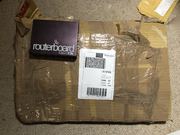 | 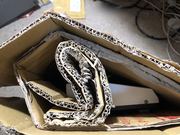 | 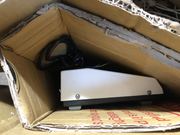 | 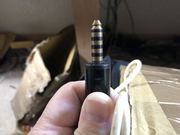 |
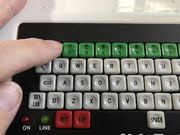 | 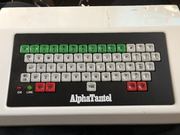 | 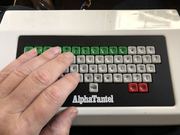 | 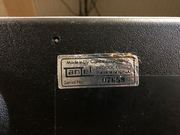 |
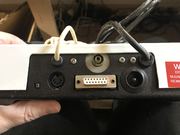 | 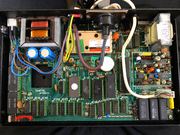 | 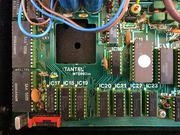 | 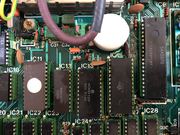 |
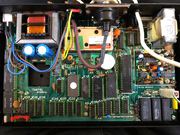 | 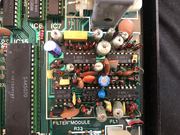 | 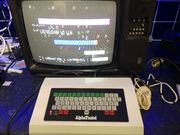 | 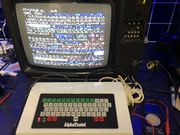 |
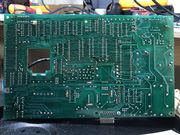 | 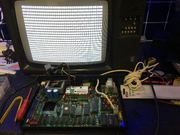 |  |  |
Update Nov 2020
Since I wasn't getting anything sensible out of the machine it was time to try and watch the boot sequence with
my 16 channel logic analyser. The problem was that try as I might I couldn't get consistent readings from the ROM or address bus on the
6504 CPU. I began to wonder if the RTC battery had in fact leaked despite visual evidence to the contrary, other than a disc capacitor
looking like it had soaked SOMETHING up. Checking voltages on the various chips around the battery area seemed to confirm this as the
SAA5070 LUCY chip was only getting 1.4V. Time to remove the admittedly pretty socket and see what was underneath.
See pics. The battery HAD leaked and corroded LUCY's socket badly, so I removed the CPU and
the MCM6810P's sockets too, fortunately damage was a lot less pronounced with those two and everything cleaned up nicely. New sockets were added.
Still no life though. Time to get out the big guns...
Since I didn't have a schematic for the board I attempted to trace one using my Magic Sponge(tm), but then I realised that
after the cleanup I hadn't rechecked the boot sequence to see if I could read it. I hooked up my HP logic analyser's probes to the ROM and set a trigger on /ROMCS
so I could see the instructions being pulled out by the CPU. This showed a tight loop very early on in the boot sequence, a code progression I'd seen
before. It looked remarkably similar to the early init sequence of my original Executel 3910 which I knew was hitting a problem with the
SAA5070 (LUCY) modem chip. I borrowed one from another Executel that I hoped was OK and the machine burst into life. Splendid!
Now I just need to work out how to program the thing. Fortunately I'm in contact with the chap who originally converted
the Micro Tantel to support a full size keyboard so he's hopefully going to come up with the Magic Runes to add phone numbers to the dialing
menu.
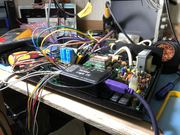 | 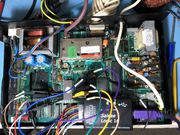 | 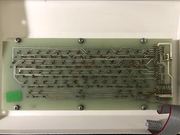 | 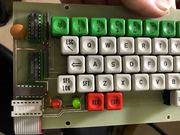 |
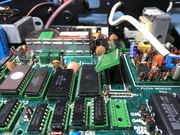 | 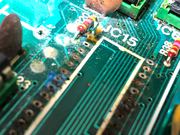 | 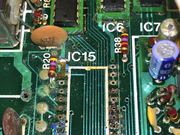 | 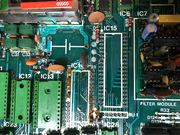 |
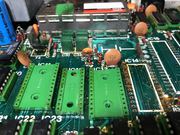 | 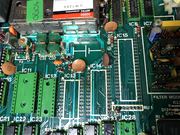 | 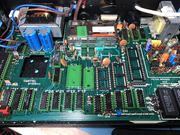 | 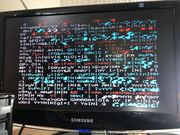 |
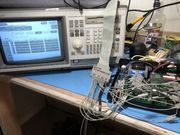 | 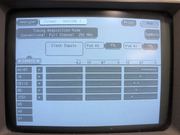 | 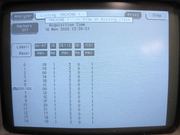 | 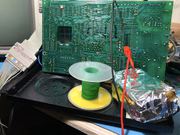 |
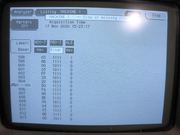 | 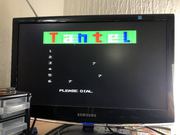 | 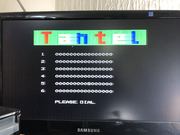 |  |